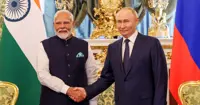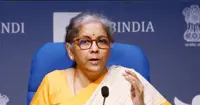IMF gives more voting rights to developing nations
30 Apr 2008
The International Monetary Fund (IMF) has formally adopted a long-pending voting reform that gives developing countries a modest 2.7 per cent increase in their voting rights, Dominique Strauss-Kahn, managing director of the multilateral lending agency said.
The IMF Board of Governors adopted the resolution by a more than 90 per cent vote. The move shifts voting rights by 2.7 per cent away from advanced economies and in favour of developing countries.
''This vote shows the overwhelming level of support across the Fund`s membership for these reforms,'' said Strauss-Kahn, adding, ''I see this result as the beginning of the new legitimacy of the Fund.''
While the approval of the resolution required 85 per cent of the total voting
power, Strauss-Kahn noted that 94.6 per cent of the members had approved the reforms, and that represented 93 per cent of the weighted voting shares distributed among the members.
The voting reforms still leave industrial nations with greater influence over IMF's decisions, by about 57-43 per cent. Yet, Strauss-Kahn called the move an "important step toward a redistribution of voting shares toward dynamic emerging market and developing countries and we expect to see a continued shift over the next decade".
In addition to changes in the quota structure, the reform package will increase the voting shares of more than two-thirds of the 185 member countries.
It will also triple the number of basic votes, the first such increase since the Fund`s creation in 1944, enabling each of the two executive directors representing African constituencies to appoint an additional alternate director.
''In particular, the tripling of basic votes reflects an innovative part of this reform effort, aimed at enhancing engagement and voice of our low-income members,'' Strauss-Kahn said. ''To preserve this element of the reforms, the package includes a mechanism that will keep constant the ratio of basic votes to total voting power in the IMF,'' he added.































